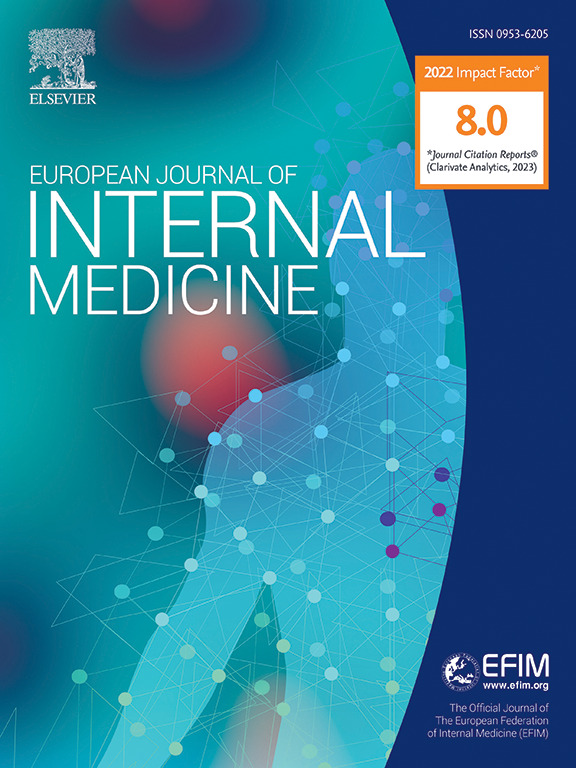炎症性肠病的代谢健康和遗传易感性:前瞻性队列研究的启示。
IF 5.9
2区 医学
Q1 MEDICINE, GENERAL & INTERNAL
引用次数: 0
摘要
背景:代谢紊乱表现出强烈的炎症基础,反之亦然。本研究旨在调查代谢健康状况、遗传易感性和炎症性肠病(IBD)风险之间的关联,并探讨具有 IBD 预定遗传风险的个体保持理想代谢状态的潜在益处:这项基于人群的前瞻性研究纳入了英国生物库中 385,820 名无血缘关系的欧洲后裔参与者。我们使用多变量 Cox 回归评估了代谢表型与 IBD 风险及其亚型之间的关系。我们还制定了一个多基因风险评分,以研究代谢健康状况与遗传风险在 IBD 风险方面的相互作用:结果:在 4,328,895 人年的随访期间,发现了 2,044 例新诊断的 IBD 病例。遗传风险越高、异常代谢表型数量越多,IBD 风险越高(P-趋势 结论:我们的研究揭示了不良代谢表型对 IBD 的综合影响:我们的研究揭示了不良代谢健康和遗传风险对 IBD 发病率的综合影响。遗传风险低且代谢健康状况最佳的人患 IBD 的风险最低,这为预先确定遗传风险的个体制定潜在的管理策略提供了启示。本文章由计算机程序翻译,如有差异,请以英文原文为准。
Metabolic health and genetic predisposition in inflammatory bowel disease: Insights from a prospective cohort study
Background
Metabolic disorders exhibit strong inflammatory underpinnings and vice versa. This study aimed to investigate the association between metabolic health status, genetic predisposition, and the risk of inflammatory bowel disease (IBD), and to explore the potential benefits of maintaining ideal metabolic status for individuals with a predetermined genetic risk of IBD.
Method
This population-based prospective study included 385,820 unrelated European descent participants from the UK Biobank. Using multivariable Cox regression, we assessed the relationship of metabolic phenotypes with risk of IBD and its subtypes. We also developed a polygenic risk score to examine how metabolic health status interacted with genetic risk in relation to IBD risk.
Results
During the follow-up period of 4,328,895 person-years, 2,044 newly-diagnosed IBD cases were identified. Higher genetic risk and an increasing number of abnormal metabolic phenotypes were associated with elevated IBD risk (p-trend <0.001). Individuals with high genetic risk and poor metabolic health had a significantly higher risk of IBD (HR=4.56, 95 % CI=3.27–6.36) compared to those with low genetic risk and ideal metabolic health. These results remained consistent for IBD subtypes. Maintaining ideal metabolic status reduced IBD risk within each genetic risk category and jointly decreased subsequent risk by 40 % in high genetic risk individuals.
Conclusion
Our study reveals a combined impact of poor metabolic health and genetic risk on IBD incidence. Those with low genetic risk and optimal metabolic health exhibit the lowest IBD risk, offering insights into potential management strategies for individuals at predefined genetic risk.
求助全文
通过发布文献求助,成功后即可免费获取论文全文。
去求助
来源期刊
CiteScore
9.60
自引率
6.20%
发文量
364
审稿时长
20 days
期刊介绍:
The European Journal of Internal Medicine serves as the official journal of the European Federation of Internal Medicine and is the primary scientific reference for European academic and non-academic internists. It is dedicated to advancing science and practice in internal medicine across Europe. The journal publishes original articles, editorials, reviews, internal medicine flashcards, and other relevant information in the field. Both translational medicine and clinical studies are emphasized. EJIM aspires to be a leading platform for excellent clinical studies, with a focus on enhancing the quality of healthcare in European hospitals.

 求助内容:
求助内容: 应助结果提醒方式:
应助结果提醒方式:


